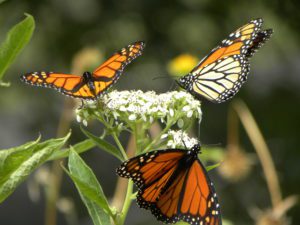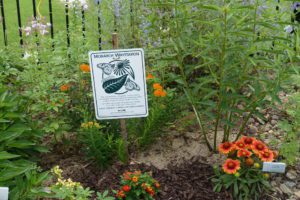

A Monarch Forum, sponsored by the Bartlesville Mayors for Monarchs and the Bartlesville Council of Garden Clubs, will be held from 6:30 to 9 p.m. April 12 at the Bartlesville Public Library. Two speakers will educate the public on the many risks facing monarchs today, and how to create a garden that will help perpetuate monarchs as well as other butterflies. Networking and viewing table exhibits begins at 6:30 p.m., followed by the presentation at 7 p.m.
Kloma Laws, who represents Mayors for Monarchs and the local garden council, invites the public to join them in learning more about the threatened monarch migration.
Dr. Kristen Baum, professor at the Department of Integrative Biology at Oklahoma State University, will talk about monarch butterfly research and how people can help. She has been studying pollinators in the southern Great Plains for more than 20 years. Her current research focuses on the effects of land use and management practices on pollinators, including monarch butterflies, native bees and honey bees.
“Many recent findings about monarchs have resulted from the contributions of citizen scientists,” said Baum, who encourages participation in citizen scientist projects to support monarch conservation efforts.
Susan Albert, local butterfly enthusiast and member of the Washington County Master Gardener Association, will present how to attract butterflies to one’s own yard by creating habitat filled with specific food plants and nectar plants for a variety of butterflies, including the monarch. Learn how to provide the essential plants necessary to sustain monarchs on their journey north in the spring and south in the fall.


In an effort to save the monarchs, multiple groups such as the National Wildlife Federation, the U.S. Fish and Wildlife Service, native plant societies, universities and many others publicized the need for monarch as well as pollinator conservation and how communities can help restore populations. Okies for Monarchs has more information on statewide projects at okiesformonarchs.org.
Locally, the Mayors for Monarchs, in partnership with the City of Bartlesville, leads the effort to spread the word about how residents can help. For more information, contact Laws at 918-213-5519.
Bartlesville Council of Garden Clubs is affiliated with Oklahoma Garden Clubs Inc.
Top: Native plants such as crownbeard that bloom during the fall migration provide nectar for monarchs.
Below left: Monarch waystations provide host and nectar plants for monarchs and other pollinators.
Information and photos provided by Susan Albert.
